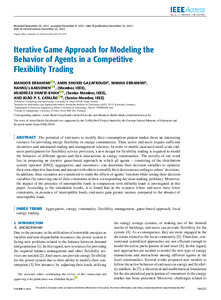Iterative Game Approach for Modeling the Behavior of Agents in a Competitive Flexibility Trading
Ebrahimi, Mahoor; Gazafroudi, Amin Shokri; Ebrahimi, Mahan; Laaksonen, Hannu; Shafie-Khah, Miadreza; Catalão, João P. S. (2021-12-10)
Ebrahimi, Mahoor
Gazafroudi, Amin Shokri
Ebrahimi, Mahan
Laaksonen, Hannu
Shafie-Khah, Miadreza
Catalão, João P. S.
IEEE
10.12.2021
Julkaisun pysyvä osoite on
https://urn.fi/URN:NBN:fi-fe202201031055
https://urn.fi/URN:NBN:fi-fe202201031055
Kuvaus
vertaisarvioitu
2021 CCBY - IEEE is not the copyright holder of this material. This work is licensed under a Creative Commons Attribution 4.0 License. For more information, see https://creativecommons.org/licenses/by/4.0/
The work of Amin Shokri Gazafroudi was supported by the CoNDyNet2 Project funded by the German Federal Ministry of Education and Research under Grant 03EK3055E.
2021 CCBY - IEEE is not the copyright holder of this material. This work is licensed under a Creative Commons Attribution 4.0 License. For more information, see https://creativecommons.org/licenses/by/4.0/
The work of Amin Shokri Gazafroudi was supported by the CoNDyNet2 Project funded by the German Federal Ministry of Education and Research under Grant 03EK3055E.
Tiivistelmä
The potential of end-users to modify their consumption pattern makes them an interesting resource for providing energy flexibility in energy communities. Thus, active end-users require sufficient incentives and automated trading and management schemes. In order to enable increased small-scale end-users participation for flexibility service provision, a new design for flexibility trading is required to model the behavior of different agents and their interactions in energy communities. The novelty of our work lies in proposing an iterative game-based approach in which all agents – consisting of the distribution system operator (DSO), aggregators, and customers– can determine their decision variables to optimize their own objective functions and interact with others to modify their decisions according to others’ decisions. In addition, three scenarios are considered to study the effects of agents’ freedom while setting their decision variables (by removing one of their constraints in their corresponding decision-making problem). Moreover, the impact of the presence of interruptible loads in comparison with shiftable loads is investigated in this paper. According to the simulation results, it is found that in the scenario where end-users have fewer constraints, in presence of interruptible loads, end-users gain greater income compared to the absence of interruptible loads.
Kokoelmat
- Artikkelit [2609]
